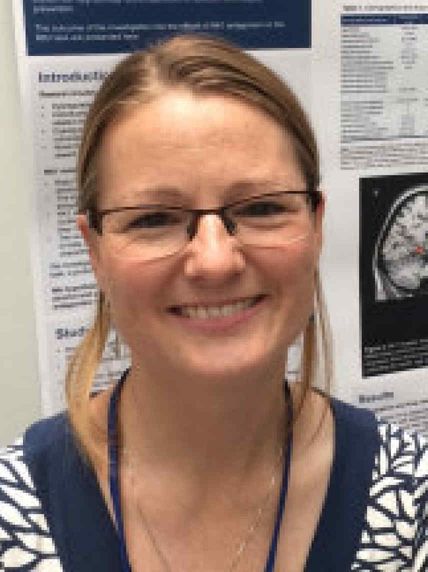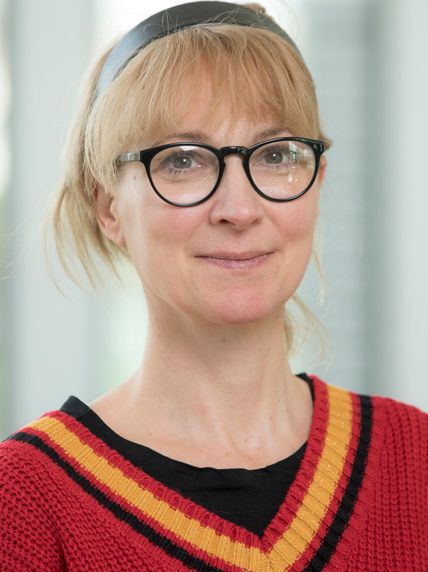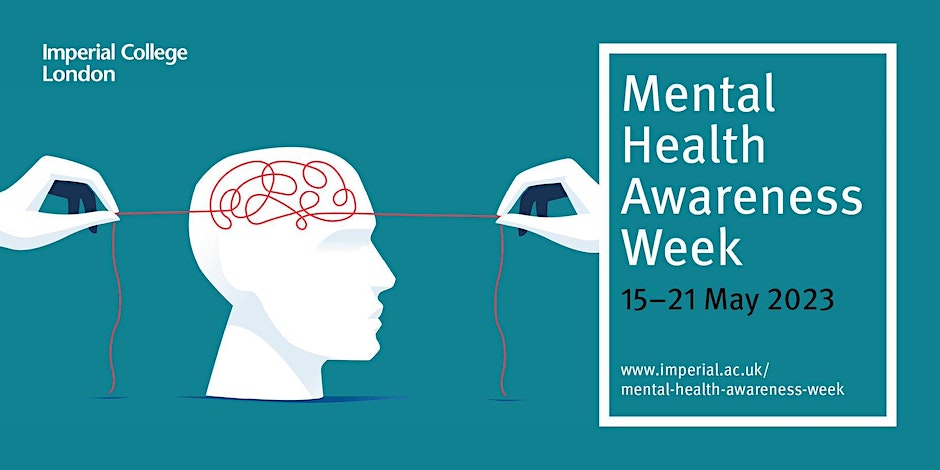As part of Mental Health Awareness Week 2023, we highlighted members across the department and asked what the week means to them, and the advice they would give to others to support good mental health.
 Rebecca Smith, MHFA Instructor/People and Culture Manager
Rebecca Smith, MHFA Instructor/People and Culture Manager
What is your role in the Department?
I recently started as the People and Culture Manager in the Department, supporting Department culture, EDI, and health and wellbeing-related initiatives across both Brain Sciences and Immunology and Inflammation. At a College level, I work as a Mental Health First Aid instructor.
What’s your involvement with mental health?
I deliver a range of MHFA training courses across the College throughout the year. Prior to joining the Department, I worked in education-based roles supporting both staff and students which included pastoral and wellbeing support. I have a particular interest in the intersectionality of race and mental health, and have represented mental health at EDI Committees across the departments I’ve worked in.
Why is Mental Health Awareness Week important to you?
We need to normalise conversations around mental health and wellbeing, so that we can recognise signs of concern both within ourselves and others at an early stage (and ultimately prevent crisis/critical events). We often speak about resilience, but that needs to be counterbalanced with providing environments people can feel vulnerable yet safe in. Having a nationally recognised week that focuses on mental health creates space for us to have those conversations, reflect, learn and move forward in a positive way.
This year’s theme for Mental Health Awareness Week is anxiety. What significance do you think this has in society?
Anxiety is one of the most common mental health issues people experience, yet is often unaddressed or overlooked. I see this first-hand in the staff and students I support. Anxiety is a natural (and sometimes helpful) human response to situations, and I would like to get to a place where people have the skills to recognise what anxiety can be managed alone and how to do that, and/or when they might need further support. At this week’s Mental Wellbeing in Higher Education Conference, there was a lot of discussion around the impact of the pandemic and rising numbers of anxiety and isolation in young people. We need to be proactive in our approaches in addressing this and recognise that there are still significant challenges ahead within this landscape.
What practical advice can you share for individuals to support good mental health?
Be kind to yourself. Self-care is not a selfish activity. Go for a walk, chat with a friend, practice boundary setting – you will feel better for it! Get engaged with the community around you (whether that’s on or off campus) as feeling a sense of belonging is so powerful. Also, remember to take time and reflect. This provides us the space to identify changes within ourselves that may indicate signs of declining mental health, and engage with our support mechanisms to address these. Many of us work in health and wellbeing support roles, and taking the time to reflect is an important reminder that we need to be well ourselves before we can safely and effectively support others.
 Professor Paul Matthews, Head of the Department of Brain Sciences/Head of the Dementia Research Institute at Imperial
Professor Paul Matthews, Head of the Department of Brain Sciences/Head of the Dementia Research Institute at Imperial
What is your role in the Department?
I am Head of the Department of Brain Sciences and Head of the UK Dementia Research Institute at Imperial.
What’s your involvement with mental health?
Professionally I am a neurologist. Part of dealing with chronic neural diseases is managing associated mental health issues. More importantly, in stressful work environments I need to manage my own mental health and support that of colleagues. Since early training, I have recognised how anxiety and other mental health issues interact and are worsened by a poor work environment. As Head of Department, I strive to manage with a commitment to ensuring the best mental health possible for people, to allow them to work to their best potential.
Why is Mental Health Awareness Week important to you?
It’s important because it helps us recognise that we all need to work on managing our own mental health and supporting the best mental health possible in our colleagues. None of us are free from the emotional pressures of work, stress, family life and the environment around us, as we were reminded by coming through Covid. This week is important because it emphasises good mental health is like good physical health – it keeps us resilient. In work environments, where we spend so much of our week, we need to be extra robust in ensuring the health of everyone working and studying here.
This year’s theme for Mental Health Awareness Week is anxiety. What significance do you think this has in society?
Anxiety is probably the most widespread and frequent mental health problem that most of us experience. It can be minor and sometimes major, and always reduces wellbeing and performance. The academic environment is a particularly challenging one for all of us who experience anxiety, because measures of success are less well defined. The best way I found to manage anxiety is to be straightforward with myself, be confident in identifying why I’m feeling anxious and then focus on addressing the root causes directly – sometimes by discussion with others and/or conversations with myself. It is something we need to be proactive about.
What practical advice can you share for individuals to support good mental health?
Ultimately good mental health comes down to being kind to yourself. We need to be able to appropriately assess the way one progresses, but equally and at the same time, recognising everything from small to big successes. Good mental health is about maintaining a balanced lifestyle, getting sleep, making sure work and life have the right balance, and maintaining physical health so we feel good about ourselves.
 Dr Louise Paterson, Advanced Research Fellow
Dr Louise Paterson, Advanced Research Fellow
What is your role in the Department?
I am an Advanced Research Fellow in the Division of Psychiatry Addiction Research group with a particular interest in substance addiction. I am also a member of the Brain Sciences EDI Committee.
What’s your involvement with mental health?
I have been researching a range of mental health conditions for nearly 20 years, conducting clinical trials, experimental medicine studies and neuroimaging studies to better understand brain mechanisms. For the last 10 years I have worked in substance addiction, and am particularly interested in developing better treatments and improving outcomes for this population who often face additional barriers to accessing treatment and stigma. I’m also involved in the Imperial College cross-faculty Mental Health Research Network which aims to bring together mental health researchers from across the College from a range of disciplines, bringing a diverse range of skills and expertise to find innovative ways to tackle some of the biggest mental health challenges.
Why is Mental Health Awareness Week important to you?
Mental Health Awareness week is a time when I try to do two things. Firstly, to take a step back from the day to day of the research I do with the team; to consider its wider impacts and think about whether we can do things better or look at things form a different perspective. Secondly, to do something positive for my own mental health. Luckily, the many activities and organised events that are staged this week provide plenty of opportunities to share ideas with a wider audience, but also to set aside time to do something for myself. This week I was privileged to be involved in a BBC1 documentary following one man’s personal account of his struggles with addiction, his journey through recovery and the impact on his loved ones Matt Willis: Fighting Addiction. The feedback has been overwhelmingly positive and I hope that this will encourage others to come forward and seek support. Stories like this ultimately help to break the stigma of addiction.
This year’s theme for Mental Health Awareness Week is anxiety. What significance do you think this has in society?
Anxiety is something that we all experience to a certain degree, particularly during stressful life events, and so we can all understand the impact it can have. Perhaps this is why we often overlook anxiety as a potentially debilitating disorder and sometimes fail to address it adequately. When left unchecked it can creep into every aspect of one’s life, impacting on relationships, sleep, work and mental wellbeing. Covid anxiety continues to be a significant problem for many and it needs to be recognised that whilst the pandemic is officially behind us, the legacy lives on in many who need support. I think climate anxiety is an area that will require significant investment in future, and we need to meet this need by recognising and addressing the problem early. Imperial is ideally placed to meet this need!
What practical advice can you share for individuals to support good mental health?
Make time for and keep doing the things you love most outside of your work environment. Hobbies, past-times, travel, whatever it is. I’m not terribly good at self-care or mindfulness but I am a very practical person. So I enjoy doing things with my hands and keeping busy; gardening, playing piano, cooking. Secondly, from a work perspective- block out time in your work diary for reading/writing/thinking. These are worthy pursuits for any career whether it is in a science, technical, administrative, teaching or pastoral care!
 Dr Victoria Burmester, Research Associate
Dr Victoria Burmester, Research Associate
What is your role in the Department?
I am a Research Associate within the Division of Psychiatry in the Department of Brain Sciences.
What’s your involvement with mental health?
I am interested in researching the mental health of young adolescents with eating disorders who come into clinics and typically get re-fed and discharged back into the world but don’t get any support with broader issues, particularly their social functioning and their friendship groups.
Why is Mental Health Awareness Week important to you?
Well, the focus of Mental Health Awareness Week is anxiety, and that theme is laced trough all sorts of mental health issues that I come across in research with adolescents. It’s what we call a transdiagnostic factor. Addressing anxiety in the eating disorder world means that you get a much better chance that that individual will be able to cope with their illness when they’re back functioning without the support of clinicians.
This year’s theme for Mental Health Awareness Week is anxiety. What significance do you think this has in society?
I think the significance that anxiety has in society has increased following the coronavirus pandemic. In my research involving adolescents, the time out of a normal social environment has exacerbated anxiety in all areas, and interfacing with the “real” world again has contributed to a surge in mental health problems, particularly for adolescents whose brains are still developing and social skills still forming.
What practical advice can you share for individuals to support good mental health?
Having a supportive social network is central because we know that, particularly for adolescents, social/peer friendships are protective against mental health problems later in life. The other thing is that feeling safe and feeling valued go hand-in-hand with a secure start in life and if those things, for whatever reason, don’t happen they need to be addressed. Resilience is also an important aspect of good mental health and, somewhat paradoxically, not solving problems for others, particularly for young people, allows space for them to generate self-confidence and independence.
 Professor Pallab Maulik, Provost’s Visiting Professor of Mental Health
Professor Pallab Maulik, Provost’s Visiting Professor of Mental Health
What is your role in the Department?
In my current role I am involved in research, building networks across ICL and beyond and teach as per need.
What’s your involvement with mental health?
I am based out of the Division of Psychiatry. I am a psychiatrist and have been involved in global mental health research for the past 25 years
Why is Mental Health Awareness Week important to you?
This helps us to draw the attention of the community to an extremely neglected health condition. Mental health is vital for overall healthy living and often one forgets its importance in the daily hustle and bustle of life. Reminding everyone about its importance both for oneself as well as others around us is vital. This also helps focus the attention on larger domestic or international issues related to mental wellbeing.
This year’s theme for Mental Health Awareness Week is anxiety. What significance do you think this has in society?
One just needs to focus on last year and the Covid period to understand how anxious everyone was and how it affected all of us. Anxiety can also be part of everyday life because of multiple challenges one faces daily. How one copes with those and comes out stronger to face the next such situation are important learnings for all of us. Also, one needs to remember that many suffer different types of anxiety disorders globally and it can be severely debilitating for those affected. A focus on anxiety disorders and an acceptance of the importance of such health conditions is important for the larger community – general or research oriented.
What practical advice can you share for individuals to support good mental health?
Be patient, understanding, pacing one’s life according to one’s ability, keeping one’s social support system close and identifying stressors and building upon past effective measures that helped in the past. At the same time if affected by e mental disorder please seek care and as your loved ones to seek care too if needed.
